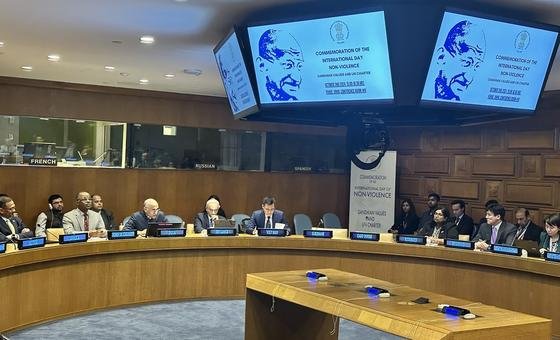UN Secretary-General Antonio Guterres, in his message to mark the International Day of Non-Violence, which is observed every year on October 2, said that conflict is wreaking havoc around the world.
He said, “Mahatma Gandhi believed that non-violence is the greatest power available to humanity – more powerful than any weapon.”
“Together, let’s build the institutions to support that brilliant idea.”
“From Ukraine to Sudan, the Middle East and beyond, war has created a hellish atmosphere of destruction, helplessness and fear,” the UN chief said.
He said discrimination and climate crisis are undermining the foundations of peace. And the hate spread on online platforms is now visible on the streets.
The UN chief said the “Conference on the Future” held in September brought hope. Countries came together to begin laying the groundwork for revitalizing multilateralism, a multilateralism capable of supporting peace in a changing world.
This includes a renewed focus on the root causes of conflict, from inequality to poverty and division.
Antonio Guterres said that now countries need to turn those proposals into reality.
Relevant echoes of Gandhi’s message of peace
United Nations General Assembly President Philemon Yang’s message was read by his Chief of Staff, Dr. Ivor Fung.
He said the International Day of Non-Violence not only celebrates Mahatma Gandhi’s birthday, but also talks about shared values such as truth, non-violence, equality and justice, which promote values. Charter of the United Nations.
“When the UN Charter was passed in 1945, the world was trying to recover from the devastation of war. Its founders wanted to create such a framework with the intention of preventing future conflicts and promoting human rights.
He said that although Mahatma Gandhi was not involved in this organization, his leadership for India’s freedom had already shown that civil disobedience and non-violent action could challenge even the most powerful systems of oppression.
Ivor Fung said Mahatma Gandhi’s teachings are still relevant today. “In a world riven by conflict, I am committed to prioritizing peace and dialogue – which are needed to bridge the divides of our divided world today.”
He said that in South Africa, leaders like Nelson Mandela and Martin Luther King Jr. were influenced by Mahatma Gandhi’s ideas like satyagraha, which taught that truth and justice are achieved not through violence, but through moral courage and peaceful dialogue.
“Today, as the world witnesses violent and painful times in Gaza, Lebanon, Myanmar, Sudan, Ukraine and elsewhere, Mahatma Gandhi’s message of peace resonates most strongly.”
Peace talks are incomplete without Gandhi
Ambassador P Harish, Permanent Representative of India to the United Nations, said at the event, “It is almost impossible to discuss peace and tolerance without mentioning the ideals, thoughts and actions of Mohandas Karamchand Gandhi.”
The Indian Ambassador said, Mahatma Gandhi, the father of the Indian nation, was a wonderful man whose life, in his own words, was an open book.
Another amazing man of the world, Albert Einstein was also a great admirer of Mahatma Gandhi and his principles and said this about Gandhiji, “The people of future generations will hardly be able to believe that such a flesh-and-blood idol ever existed. lived on earth.”
Strength comes from truth
Indian Ambassador P Harish said India’s story reflects Mahatma Gandhi’s belief that strength comes from truth, not power; Strength comes from truth, not force, and victory comes from moral courage, not imposed submission.
“It was a very right decision by the United Nations to declare Mahatma Gandhi’s birthday on October 2 as the International Day of Non-Violence.”
He said that the celebration of this day helps to reflect on Gandhiji’s life and reaffirm the universal relevance of the principle of non-violence to ensure a culture of peace, tolerance and understanding across the world.

